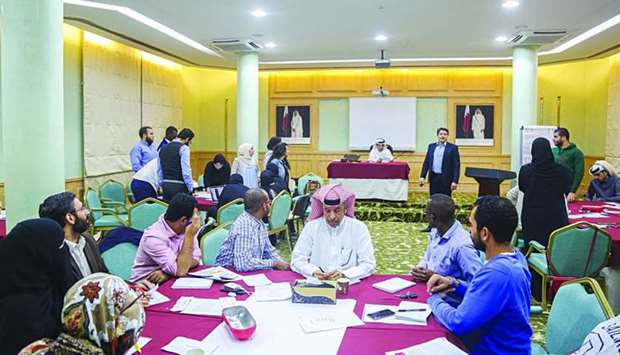The purpose of the course is to build the capacity of volunteers in disaster response, through a set of advanced topics instructed by seven internationally-certified trainers. These topics included disaster management policies, media relations in emergency, stress management, co-ordination across the International Red Cross and Red Crescent Movement and the United Nations, Movement Code of Conduct, and assessment methodology and tools.
Other topics covered by the course were the auxiliary roles of national societies, volunteer management in emergency, field safety and security, information centre and reporting, disaster response tools, working with local community, project planning, team work, and leadership development.
This course is part of a year-round disaster preparedness program conducted by QRCS to enhance community preparedness skills under the supervision of disaster management specialists.
In the end of the course, a disaster scenario exercise was implemented to measure co-ordination and quick response. The closing session was attended by Rashid S al-Mohannadi, general director, Relief and International Development Division at QRCS, as well as a group of MA students at the Centre for Conflict and Humanitarian Studies (CHS), Doha Institute for Graduate Studies.
A special course on shelter in emergency was given to 15 CHS researcher students in completion of the requirements of their academic programme. QRCS and Doha Institute have a Memorandum of Understanding to work together in training, exchange of experience, and joint research projects.
Al-Mohannadi welcomed the participants and gave them a presentation about QRCS’s history, humanitarian mission, and local and international achievements. He highlighted QRCS’s Disaster Management Camp as an important event to create a base of youths qualified in immediate disaster response.
Dr Ghassan al-Kahlout, PhD in Post-War Recovery Studies, emphasised the importance of partnership with Qatari humanitarian organisations, primarily QRCS, which serves to enhance the practical experiences of MA students.
At the closing ceremony, the participants commended the content of the course, which added significantly to their information and skills both in disaster management and academic progress. The cyclone simulation was particularly beneficial as an international standard response and coordination training, a rarely available practice for humanitarian service providers prior to engagement in risky field operations.

Volunteers at a session of the disaster management training course
Qatar Red Crescent Society (QRCS) has concluded a five-day advanced disaster management training course for 31 volunteers who had graduated from its seventh Disaster Management Camp.
